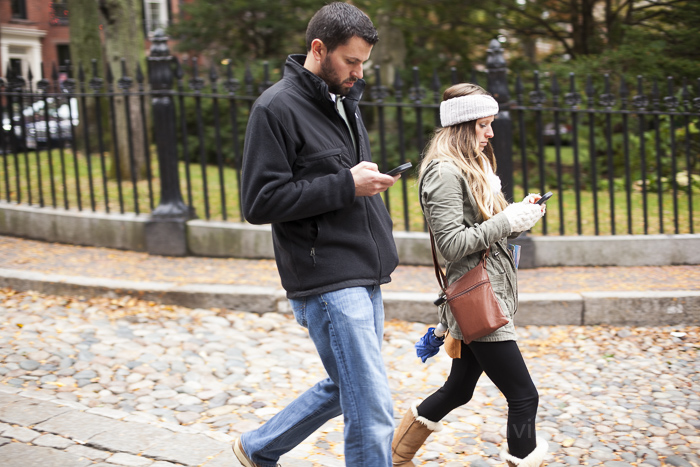The Issue: Need directions? Or a restaurant recommendation? These days, you’d probably seek help on your smartphone — a handy know-it-all device that can spit out answers to almost anything anywhere at any time. But a mere ten years ago, you may have asked someone — a neighbor, a stranger — for help. A new paper looks at the unseen social costs of this change in how we obtain information and interact with others.
An academic study worth reading: “The Social Costs of Ubiquitous Information: Consuming
Information on Mobile Phones Is Associated with Lower Trust,” published in PLoS ONE, 2016.
Study summary: Psychologists Kostadin Kushlev of the University of Virginia and Jason Proulx of the University of British Columbia investigate if using smartphones is associated with declining trust in others, what they call “the social lubricant of society.” The authors theorize that “by changing where and what information people have access to, ubiquitous computing may decrease people’s interdependence with other members of society — especially those we normally encounter only outside of the sphere of close relationships.” For example, are smartphone users less inclined to ask people for advice or information — such as directions or restaurant recommendations — when they could turn to Google?
The authors used a nationally representative sample of 2,187 Americans who answered questions on how often they rely on mobile phones and other sources of information, and how much they trust other groups, including family, neighbors, foreigners and strangers. With these data points, controlling for demographic and geographic variables, they were able to “explore the relationship between mobile information and trust.” They also assessed whether this relationship depends on social bonds. For example, are family members more trustworthy than strangers?
Findings:
- The more someone uses a smartphone for information, the less likely she is to trust “neighbors, strangers, and people from other religions or nationalities.”
- Reliance on smartphones had no correlation with how much people trust those from their inner circle, such as family members.
- Demographic factors do not explain these findings.
- The authors interpret the findings: “We theorized that mobile information erodes trust in strangers by interfering with casual opportunities to talk with strangers and by obviating the need to rely on others.”
- It is possible that the correlation could be understood in the reverse: That “people who trust others less might be more likely to use their mobile phones for information.”
Helpful resources:
- The International Data Corporation, a market-research firm, publishes data on global smartphone sales and other IT-related topics.
- The Economist’s Technology Quarterly offers insightful angles on the technology beat.
- Christopher Soghoian at the American Civil Liberties Union is a widely cited technology researcher and privacy advocate.
- The Pew Research Center has a page dedicated to internet, science and technology research.
Other research:
- This 2016 paper in the Proceedings of the National Academy of Sciences, “The Spreading of Misinformation Online,” charts the “massive diffusion of unverified rumors” online.
- This 2016 study, also in the Proceedings of the National Academy of Sciences, finds lower mortality risks for people with strong online and offline social networks.
- This 2011 paper in Science shows that between the 1980s and mid-2000s, Americans’ consumption of information jumped fivefold.
- Journalist’s Resource has profiled papers on the rise of mobile news platforms and Americans’ declining trust in both others and institutions.
Keywords: Smartphones, Google, asking questions, strangers, trust


Expert Commentary